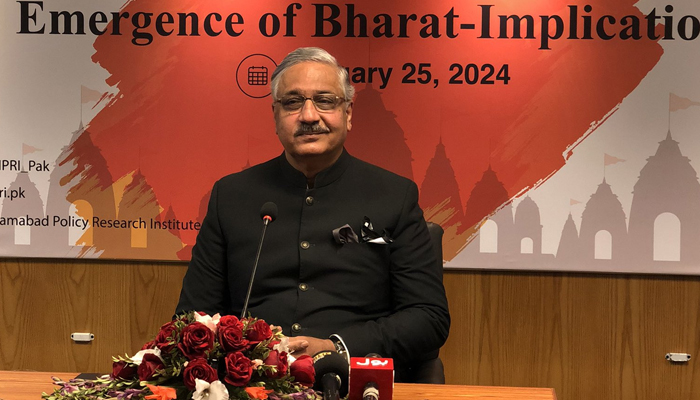Former CJCSC warns of growing Hindutva threat
General Hayat highlighted the dangers of the saffronisation of Indian society, warning of internal polarization and regional conflicts
Islamabad : In a distinguished lecture series talk at the Islamabad Policy Research Institute (IPRI), former Chairman Joint Chiefs of Staff Committee (CJCSC) General (r) Zubair Mahmood Hayat expressed deep concern over the rising influence of Hindutva in Indian politics. General Hayat highlighted the dangers of the saffronisation of Indian society, warning of internal polarization and regional conflicts.
During his address, General (r) Hayat underscored the exclusivist nature of the Hindutva ideology, attributing it to the ruling Indian BJP government's alignment with the right-wing extremist Hindu Rashtriya Swayemsevak Sangh (RSS). He quoted RSS ideologue Golwalker, pointing to Ghar Wapsi, Shudi, and Sangathan as core tenets, emphasizing their aim to convert Muslims to Hinduism and foster bellicose solidarity among Hindus.
The former military leader drew parallels between the present situation in India and the rise of fascism in Europe under the Nazis. He criticized the Modi administration for fostering an environment of hate towards minorities and neighbouring countries, particularly under the ‘Akhand Bharat’ notion, which envisions a mythological map coveting territories of nine countries.
General Hayat condemned the destruction of the Babri Mosque and the construction of the Ram Mandir, equating it to building a Hindu temple by demolishing Saint Paul's Church in London. He urged the international community to recognize the looming threat to regional and global peace posed by this fascistic religious creed influencing Indian politics.
The lecture, attended by a diverse audience comprising think tank experts, former diplomats, academia, and media, received an effusive response, highlighting the urgency of addressing the concerns raised by General Zubair Mahmood Hayat regarding the trajectory of Indian politics and its potential ramifications on regional stability.
-
 Nicole Kidman Celebrates Galentine’s Day Months After Keith Urban Split
Nicole Kidman Celebrates Galentine’s Day Months After Keith Urban Split -
 Justin Bieber Unveils Hailey Bieber As First Face Of SKYLRK In Intimate Campaign Debut
Justin Bieber Unveils Hailey Bieber As First Face Of SKYLRK In Intimate Campaign Debut -
 Caitlin O’Connor Says Fiance Joe Manganiello Has Changed Valentine’s Day For Her
Caitlin O’Connor Says Fiance Joe Manganiello Has Changed Valentine’s Day For Her -
 Rachel Zoe Sends Out Message For Womne With Her Post-divorce Diamond Ring
Rachel Zoe Sends Out Message For Womne With Her Post-divorce Diamond Ring -
 James Van Der Beek's Final Conversation With Director Roger Avary Laid Bare: 'We Cried'
James Van Der Beek's Final Conversation With Director Roger Avary Laid Bare: 'We Cried' -
 Jaden Smith Walks Out Of Interview After Kanye West Question At Film Premiere
Jaden Smith Walks Out Of Interview After Kanye West Question At Film Premiere -
 Why Halle Berry Wasn't Ready For Marriage After Van Hunt Popped Question? Source
Why Halle Berry Wasn't Ready For Marriage After Van Hunt Popped Question? Source -
 Michelle Obama Gets Candid About Spontaneous Decision At Piercings Tattoo
Michelle Obama Gets Candid About Spontaneous Decision At Piercings Tattoo -
 Bunnie Xo Shares Raw Confession After Year-long IVF Struggle
Bunnie Xo Shares Raw Confession After Year-long IVF Struggle -
 Brooks Nader Reveals Why She Quit Fillers After Years
Brooks Nader Reveals Why She Quit Fillers After Years -
 Travis Kelce Plays Key Role In Taylor Swift's 'Opalite' Remix
Travis Kelce Plays Key Role In Taylor Swift's 'Opalite' Remix -
 How Jennifer Aniston's 57th Birthday Went With Boyfriend Jim Curtis
How Jennifer Aniston's 57th Birthday Went With Boyfriend Jim Curtis -
 JoJo Siwa Shares Inspiring Words With Young Changemakers
JoJo Siwa Shares Inspiring Words With Young Changemakers -
 James Van Der Beek Loved Ones Breaks Silence After Fundraiser Hits $2.2M
James Van Der Beek Loved Ones Breaks Silence After Fundraiser Hits $2.2M -
 Disney’s $336m 'Snow White' Remake Ends With $170m Box Office Loss: Report
Disney’s $336m 'Snow White' Remake Ends With $170m Box Office Loss: Report -
 Travis Kelce's Mom Donna Kelce Breaks Silence On His Retirement Plans
Travis Kelce's Mom Donna Kelce Breaks Silence On His Retirement Plans




